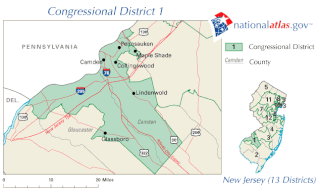
William Pennington was an American politician and lawyer. He was the 13th governor of New Jersey from 1837 to 1843. He served one term in the United States House of Representatives, during which he served as Speaker of the House from 1860 to 1861.
These are tables of congressional delegations from New Jersey to the United States Senate and United States House of Representatives.
New Jersey's 8th congressional district is currently represented by Democrat Rob Menendez, who has served in Congress since January 2023. The district is majority Hispanic, and includes some of the most urban areas of New Jersey, including parts of Newark and Jersey City, as well as Elizabeth.

The 1812–13 United States House of Representatives elections were held on various dates in various states between August 3, 1812, and April 30, 1813. Each state set its own date for its elections to the House of Representatives before the first session of the 13th United States Congress convened on May 24, 1813. They coincided with James Madison being re-elected president.

The 1798–99 United States House of Representatives elections were held on various dates in various states between April 24, 1798 in New York and August 1, 1799 in Tennessee. Each state set its own date for its elections to the House of Representatives, with some after the official start of the 6th United States Congress on March 4, 1799, but before the start of the first session of this Congress in Philadelphia on December 2, 1799. These elections were held during President John Adams term. It was the last congressional session before the move to the new capital at Washington, D.C. Elections were held for all 106 seats, representing 16 states.
New Jersey's 12th congressional district is represented by Democrat Bonnie Watson Coleman, who has served in Congress since 2015. The district is known for its research centers and educational institutions such as Princeton University, Rider University, The College of New Jersey, Institute for Advanced Study, Johnson & Johnson and Bristol-Myers Squibb. The district is primarily suburban in character, covering portions of Mercer, Somerset, Union, and Middlesex counties, although the district contains the state capital of Trenton as well as the smaller city of Plainfield.
New Jersey's 10th congressional district is an urban congressional district in the U.S. state of New Jersey. The district consists of portions of Essex, Hudson and Union counties, and includes the cities of Newark and Orange. The district is majority African American and is represented in Congress by Democrat LaMonica McIver, who was sworn in on September 23, 2024 to finish the term of the late Donald Payne, Jr.
New Jersey's 9th congressional district is an urban congressional district in the U.S. state of New Jersey, and was represented in Congress by Democrat Bill Pascrell until his death in 2024, first elected in 1996 from the old 8th district. The 9th district consists largely of municipalities in Bergen and Passaic Counties.
New Jersey's 6th congressional district is represented by Democrat Frank Pallone, who has served the district in Congress since 1993. The district includes the northern and eastern portions of Middlesex County and the coastal areas of Monmouth County, including towns along the Raritan Bay.
New Jersey's 5th congressional district is represented by Democrat Josh Gottheimer, who has served in Congress since 2017. The district stretches across the entire northern border of the state and contains most of Bergen County, as well as parts of Passaic County and Sussex County.
New Jersey's 4th congressional district is a congressional district that stretches along the New Jersey Shore. It has been represented by Republican Chris Smith since 1981, the second-longest currently serving member of the US House of Representatives and the longest serving member of Congress from New Jersey in history.
New Jersey's 3rd congressional district is represented by Democrat Andy Kim of Moorestown who has served in Congress since 2019.

New Jersey's 1st congressional district is a congressional district in the U.S. state of New Jersey. The district, which includes Camden and South Jersey suburbs of Philadelphia, has been represented by Democrat Donald Norcross since November 2014. It is among the most reliably Democratic districts in New Jersey, as it is mainly made up of Democratic-dominated Camden County.
This is a complete list of current members of the United States House of Representatives based on seniority. For the most part, representatives are ranked by the beginning of their terms in office. Representatives whose terms begin the same day are ranked alphabetically by last name.

New Jersey elected its members November 7, 1820. There were an unusually large number of candidates, 119 candidates according to one contemporary newspaper. Some candidates ran under an "Anti-Caucus" ticket. Only 1 of the 6 six incumbents would serve in the next term, as 4 retired and 1 died after re-election.

New Jersey held its election October 10–11, 1814. The state returned to an at-large basis for electing its representatives, abolishing the short-lived districts of the previous election.

New Jersey elected its members November 4, 1828.





